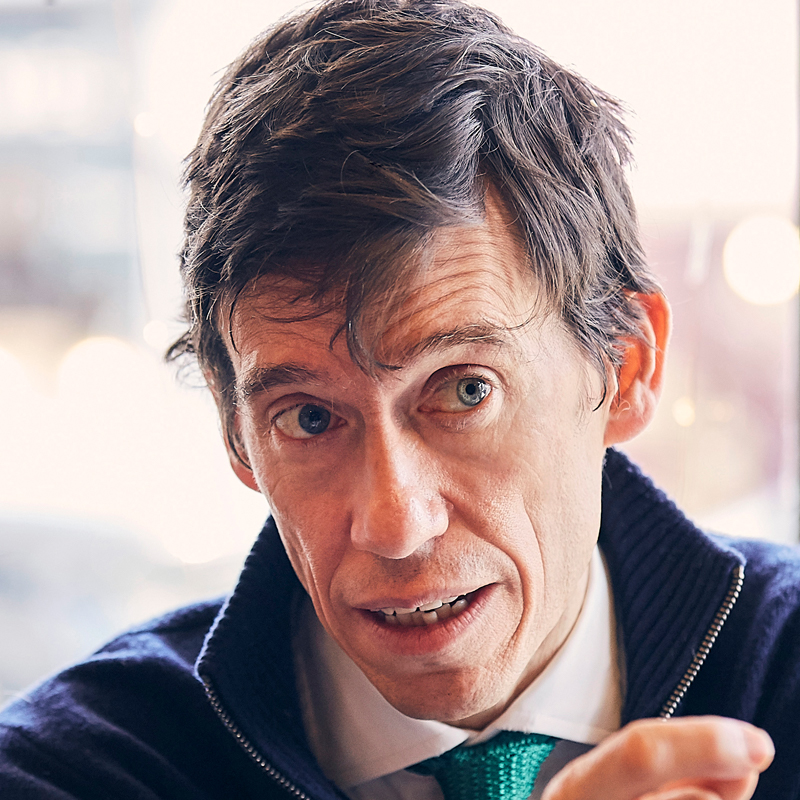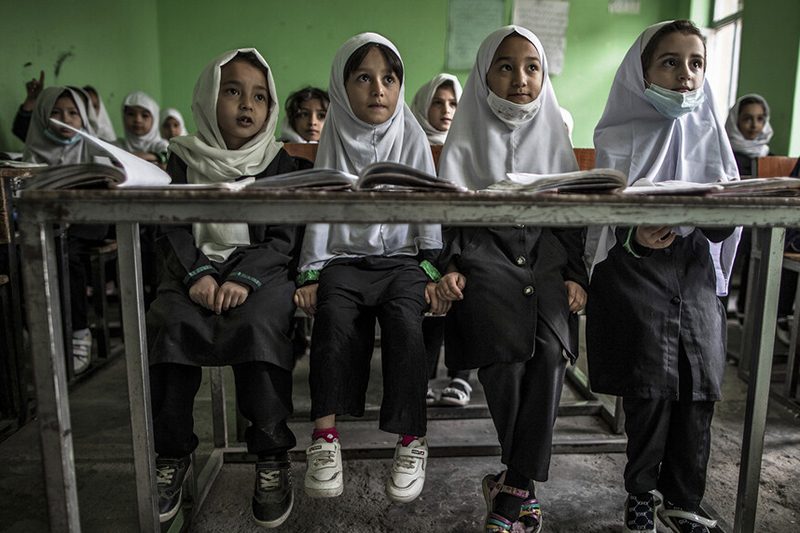Young Afghan girls attend class in a primary school in Kabul, Afghanistan.
Rory Stewart brings a unique and nuanced perspective to any discussion of Afghanistan. Few westerners know the country like he does.
Stewart walked across Afghanistan in 2002, a trek he recounted in his widely acclaimed 2006 book “The Places in Between.” In 2005, he moved to Kabul to establish and lead the Turquoise Mountain Foundation, a nonprofit organization that works to revive craft industries.
 A former diplomat, British cabinet secretary, and member of Parliament, Stewart is a senior fellow at Yale’s Jackson Institute for Global Affairs. In that role, he has helped established the Yale Development Dialogues, a discussion series jointly presented by the Jackson Institute, the Department of History, and Yale’s Economic Growth Center that applies lessons from history and economics to policy problems in developing countries. On Nov. 16, he will participate in a Development Dialogues panel discussion on the humanitarian challenges facing Afghanistan in the wake of the U.S. withdrawal.
A former diplomat, British cabinet secretary, and member of Parliament, Stewart is a senior fellow at Yale’s Jackson Institute for Global Affairs. In that role, he has helped established the Yale Development Dialogues, a discussion series jointly presented by the Jackson Institute, the Department of History, and Yale’s Economic Growth Center that applies lessons from history and economics to policy problems in developing countries. On Nov. 16, he will participate in a Development Dialogues panel discussion on the humanitarian challenges facing Afghanistan in the wake of the U.S. withdrawal.
Stewart recently shared his perspective on the situation in Afghanistan. The interview has been edited and condensed.
What progress had you witnessed in Afghanistan over the past 20 years?
In 2002, just at the end of the Taliban period, I walked more than 500 miles from Herat in western Afghanistan to Kabul. Along the way, I came upon villages that had been burnt to the ground. The Taliban had devastated those communities. It was essentially a genocide. No women were going to school. There was no electricity. No roads. No incomes. No livelihoods. Those same rural communities at the beginning of this year were vibrant. There were roads and electricity. There was a network of health clinics. When I was sick in those areas 20 years ago, it was a three-day walk to the nearest clinic, which didn’t have any medicine. Now there are pharmacies. There are doctors. There are schools. A whole generation of women have been able to get education through high school, and many of them have gone on to university and gotten jobs in the government.
It was an extraordinary transformation. I feel it through the Afghans I know and the ways that their lives have changed. They’ve gone from being amongst the poorest people in the world to living standards comparable, in many cases, to countries like India. But sadly, all of that has been undone almost overnight. It’s heartbreaking.
What could the United States and other western countries do now to help the Afghan people?
The U.S. government could be much more generous and much more flexible. There was no reason for the State Department to stop all its funding to Afghanistan. It cut off funding for small cultural projects in Kabul, which had nothing to do with the Taliban government. Prior to the U.S. withdrawal, 60% of the Afghan government’s budget came from international aid. That’s gone now.
To help the Afghan people, the United States and other western countries could decide that it doesn’t make sense to cripple the Afghan export industry. For instance, it doesn’t make sense to destroy the livelihoods of a million Afghan women working in the carpet industry. It’s bad enough to withdraw from the country and hand it over to the Taliban, but essentially strangling the Afghan economy only adds insult to injury.
Is there a better way to pursue humanitarian interventions in countries like Afghanistan?
We must abandon this “all in or all out” mentality and be much better at developing patient, moderate partnerships with the countries we want to help. We spray the most incredible amount of money, say over $1 trillion, at a country and call that place the greatest threat to global security, and then suddenly turn around the next moment and effectively say the same country doesn’t matter at all. I would much rather see a steadier, lighter, more balanced involvement around the world.
And that applies not just internationally, but domestically as well. Think about the kind of partnership that you’d want to form with a challenged community in the United States, say in an ex-coal mining town in Kentucky or an indigenous community in South Dakota. You’d want to have a patient, long-term partnership in which you listen to people there and are respectful of them. You wouldn’t try to solve all their problems by dropping trillions of dollars on them.
But equally, after 20 years, you wouldn’t just say that you’ve made as much progress as you can, wash your hands the whole thing, and leave while claiming the community is somehow cowardly, incompetent, corrupt, and doesn’t deserve your money, which is the tone President Biden has taken with Afghanistan.
You’ve said that Afghanistan had experienced a period of marked improvement after the Taliban was toppled from power. When did that positive trajectory begin to change?
The trajectory changed in about 2005. It changed because people became overly ambitious. Things were going reasonably well. The Taliban insurgency was contained. The country’s economy had nearly doubled in size. Things were going well in the north of the country, but people became concerned about South Afghanistan. It was being run by corrupt warlords and the poppy trade was booming.
At that point, the United States and its allies faced a choice: They could say, “Fine, that’s happening, and it’s very unfortunate, but there’s not a great deal we can do about it. And in fact, if we try to get involved, we may well end up making things worse.” But that would have required a lot of self-knowledge, humility, and restraint. It might have been difficult to communicate to the public that we’re going to accept that many things will be far from ideal, but that we are confident that, over time, we can improve important things in meaningful ways. Instead, NATO began sending in more and more troops. It drove away its Afghan allies, turning them into enemies who linked up with the Taliban. It gave the Taliban the opportunity to claim that they were fighting a foreign military occupation.
What drove that misguided ambition?
Stewart: I think it comes from the conviction that every problem has a solution. It comes from a culture that can’t tolerate partial failure or messiness. It wants to fix everything and do it quickly. People say we didn’t have the right plan. We didn’t have the right strategy. The truth is that there can’t really be a plan or strategy for rebuilding an entire nation. It’s too complicated and chaotic. Saying there wasn’t a plan implies that somewhere in some drawer is a magic plan, and if you just got your hands on it, you could occupy somebody else’s country and fix everything. It simply was not possible for foreigners to go into southern Afghanistan and totally rebuild the political, economic, and security structures there.
A more modest mission was possible. We could have improved the lives of millions of Afghans if we’d been patient. We could have continued to develop education, health care, and road infrastructure. We could have supported free and fair elections. We could have made sure that Afghanistan was more stable and more prosperous than it had been in the past.
How are you enjoying your role at the Jackson Institute?
Stewart: I’m loving it. I’m teaching three courses this semester: one undergraduate course and two graduate seminars. It’s been incredibly exhilarating. The students are incredibly curious and engaged.
Jim Levinsohn, director of the Jackson Institute, has built something unique here: a public policy program with a vibrant intellectual culture. The students are taught to patiently think critically about complex issues. I think Jackson will be an excellent school of global affairs when that transition is completed next fall.
I’ve had a wonderful time working with Rohini Pande, a distinguished development economist and director of the Economic Growth Center, and Sunil Amrith, an accomplished historian of modern South Asia, on the Yale Development Dialogue series. I’m a practitioner who has run an international development organization, so it’s been very rewarding to work alongside two top-flight scholars to explore pressing policy issues. I’m looking forward to our November 16 event about the future of Afghanistan. It should be a robust and thought-provoking discussion.
